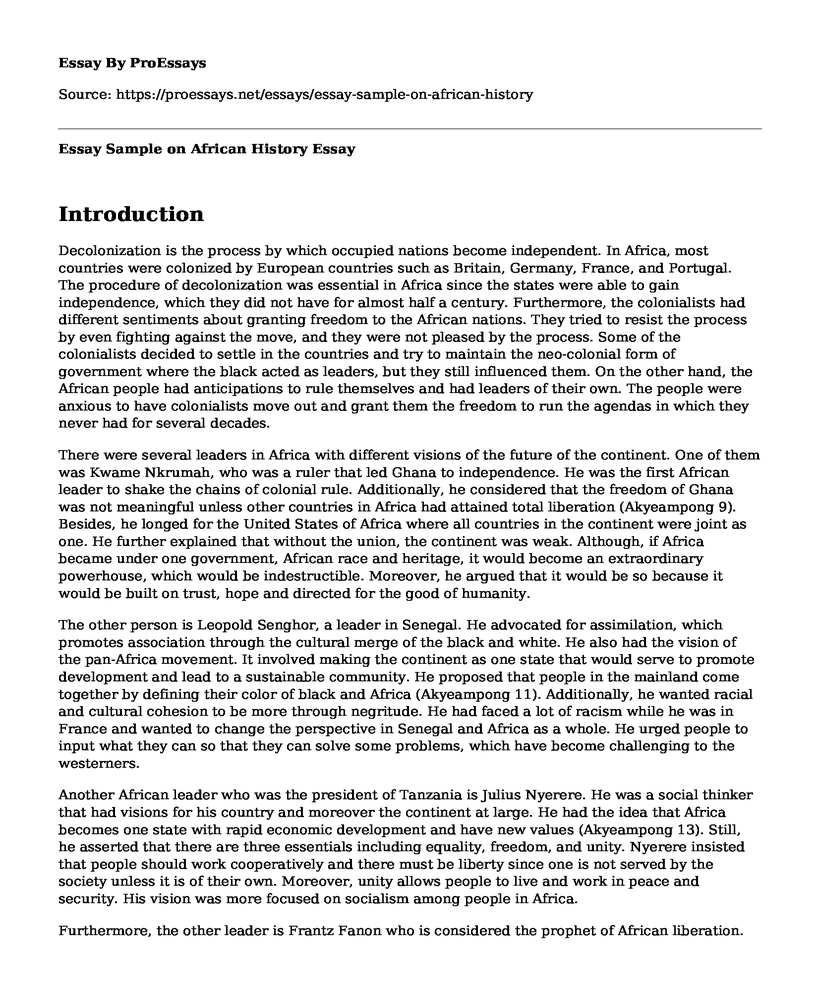Introduction
Decolonization is the process by which occupied nations become independent. In Africa, most countries were colonized by European countries such as Britain, Germany, France, and Portugal. The procedure of decolonization was essential in Africa since the states were able to gain independence, which they did not have for almost half a century. Furthermore, the colonialists had different sentiments about granting freedom to the African nations. They tried to resist the process by even fighting against the move, and they were not pleased by the process. Some of the colonialists decided to settle in the countries and try to maintain the neo-colonial form of government where the black acted as leaders, but they still influenced them. On the other hand, the African people had anticipations to rule themselves and had leaders of their own. The people were anxious to have colonialists move out and grant them the freedom to run the agendas in which they never had for several decades.
There were several leaders in Africa with different visions of the future of the continent. One of them was Kwame Nkrumah, who was a ruler that led Ghana to independence. He was the first African leader to shake the chains of colonial rule. Additionally, he considered that the freedom of Ghana was not meaningful unless other countries in Africa had attained total liberation (Akyeampong 9). Besides, he longed for the United States of Africa where all countries in the continent were joint as one. He further explained that without the union, the continent was weak. Although, if Africa became under one government, African race and heritage, it would become an extraordinary powerhouse, which would be indestructible. Moreover, he argued that it would be so because it would be built on trust, hope and directed for the good of humanity.
The other person is Leopold Senghor, a leader in Senegal. He advocated for assimilation, which promotes association through the cultural merge of the black and white. He also had the vision of the pan-Africa movement. It involved making the continent as one state that would serve to promote development and lead to a sustainable community. He proposed that people in the mainland come together by defining their color of black and Africa (Akyeampong 11). Additionally, he wanted racial and cultural cohesion to be more through negritude. He had faced a lot of racism while he was in France and wanted to change the perspective in Senegal and Africa as a whole. He urged people to input what they can so that they can solve some problems, which have become challenging to the westerners.
Another African leader who was the president of Tanzania is Julius Nyerere. He was a social thinker that had visions for his country and moreover the continent at large. He had the idea that Africa becomes one state with rapid economic development and have new values (Akyeampong 13). Still, he asserted that there are three essentials including equality, freedom, and unity. Nyerere insisted that people should work cooperatively and there must be liberty since one is not served by the society unless it is of their own. Moreover, unity allows people to live and work in peace and security. His vision was more focused on socialism among people in Africa.
Furthermore, the other leader is Frantz Fanon who is considered the prophet of African liberation. He shared the idea of Pan-Africa movement where the continent would become as one state. Additionally, he was determined for people to counter colonial violence and the liberation struggle (Akyeampong 17). He had visions for Africa where another species of individuals would replace one species of people. He considered colonialism brought back the continent by making the existence of tribes, which raised chaos in Africa. Therefore, Fanon tried to counter neo-colonialism or colonialism.
Conclusion
In conclusion, there were mixed feelings for the decolonization of African countries. The people of the continent were anxious to rule themselves and 'run things' in their nations. African leaders such as Nyerere, Fanon, Senghor, and Nkrumah shared the opinion to make Africa become one state and unite people as one under unity, equality and freedom. The visions they had were to make Africa liberal.
Work Cited
Akyeampong, Emmanuel. "African socialism; or, the search for an indigenous model of economic development?" Economic History of Developing Regions (2018): 1-19.
Cite this page
Essay Sample on African History. (2022, May 03). Retrieved from https://proessays.net/essays/essay-sample-on-african-history
If you are the original author of this essay and no longer wish to have it published on the ProEssays website, please click below to request its removal:
- History of Christianity in Hui Research
- Paper Example on Second World War
- Essay on American Presidency General Elections in Alabama Since 2000
- The Surge of Nationalism: Race, Nationalism, and War Essay Example
- Internship in Canada: Legal Issues, Benefits, and Challenges - Essay Sample
- Migrants Seeking Greener Pastures: The North Triangle in America - Research Papepr
- Article Review Sample on American Society for Public Admin: A Study by Richard Stillman







